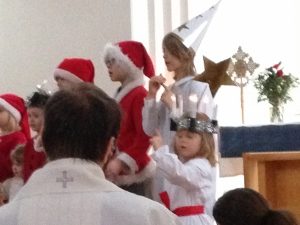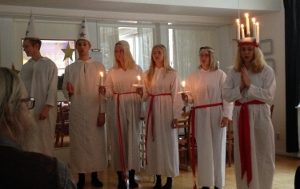The Saint Lucia (A.D. 283–304) of Syracuse, Sicily, is celebrated in Nordic countries on December 13. The Sunday service had a preview of coming attractions.

On Sunday evening, Anya and I were invited over for fika at a colleague’s house. There were several colleagues and others from church for a nice gathering–with an awesome homemade cheesecake. There were no references to Lucia but great conversation (in English for quite a bit of it).
With the snow earlier in the day, we were glad for our studded bike tires.

On Monday, I joined my friends in språk cafe at the church for some practice of Swedish.

They also had a little end of the year fika with the saffron buns that are traditional for Sankta Lucia day. I sat with a nice Kurdish man with pretty good Swedish after being here with his family for two years and some basic English.

While at the church, we saw the public middle school practicing their Sankta Lucia program that would take place the next day. This is amazing to me! This is a Christian saint who continues to be venerated at a church in one of the most secular countries in the world. Yet, my classes in a school of theology are too be taught in a non-confessional way (more on this below), but middle school youth can go to a church and sing a song about a Christian saint!
Today at Johannelund, the Bible school led a Sankta Lucia celebration with the traditional saffron buns and glogg (non-alcoholic, this is a dry campus).

While the Swedish government has legislated that all accredited (thus government funded) instruction is to be non-confessional, there are optional reflection times for each course to discuss faith content in addition to the daily chapel times (called morning prayer with a weekly mass with the Eucharist). One reflection time was today. My co-teacher led this, as he is a Swede, and it helps to have faith discussions in one’s mother tongue. However, that meant that I missed some of the details.
I did tell him that I needed to take off a bit early, because I was asked to repeat part of my presentation from the research seminar two weeks ago for those who were not able to attend. It was during lunchtime, so students and faculty could come. The one student who came last time came again and brought some friends, as well as a visiting Tanzanian pastor on a cultural exchange (bundled up in a parka the whole time). In the group were two former rektors (principals) of Johannelund and the director of the Swedish Evangelical Mission (actually, my boss’ boss!). This was an amazing opportunity to be a cheerleader for a global perspective and encourage the continuation of the long-term year relationships in Africa (some 150+ years), especially with Ethiopia and Tanzania.
In addition to demonstrating how amazingly Johannelund is positioned for the rise of world Christianity in Africa (and that no other academic or theological program in Sweden was as well positioned for this global reality), I encouraged them to consider how we can shape our pedagogy to not only be more faithful to our mission (within the Swedish boundaries) but to go beyond the “epistemic hegemony” of only Western “scientific” epistemology and engage the other ways of knowing to connect with the Global South. (For those who care, I quoted two past Society of Biblical Literature presidential addresses by Elizabeth Schüssler Fiorenza [1987], who advocated for a rhetorical approach, and Fernando Segovia [2014], who said we miss out if we don’t engage the epistemologies from the global south.) I sense it went well, but also how I understand a bit more about why I was brought here. I don’t have all the answers, but I’ve already be able to stimulate some important conversations with some very bright and passionate people!
Afterwards, I was talking with my big boss. He was hoping that this conversation could continue. I mentioned that I would recommend my PhD adviser, who is much wiser than I am. Because my adviser was rektor of my Norwegian institution, he understands more of the Scandinavian issues of a higher education institution owned by a mission agency in a secular context. Providentially, my adviser has been invited to Johannelund in February as part of the retirement celebration symposium that they are throwing for my Old Testament co-teacher (the one I will follow at OT instructor). It seems that there is a kairos opportunity here (meaning a Providential window of opportunity), and I get to be a part of it!
More on the non-confessional class content… I had one more amazing conversation today with a former student (who is overflowing with lovely personality). While teachers are limited in what can be said in formal class times (but are not restricted in the reflection times), students are not. So, in talking with this former student, I realized that my last few years of developing learner-centered instruction (with an amazing pedagogy coach from Seattle U) may be a creative solution here. I can facilitate the lessons so that students are unleashed in ways that make the learning more holistic. There still needs to be more reflection time, but I’m used to that. This course has about 39% less class time and about 25% more reading that what I had in the USA. Perhaps the conversations can continue for those who want to join me for lunch!
Yes, Lucia is still celebrated for light in the midst of darkness. One version of her story is that that crown of candles on her head freed up her hands so that she could carry more food to the Christians hiding in the dark catacombs in Rome who were fleeing persecution. Perhaps today, we not only bring light, but like Lucia, we can be innovative as to how to develop important means of ministry in spite of some limitations.
And I close with what greeted me this morning, a stunning sunrise that took forever to rise.
With blessings,
Beth

Absolutely beautiful sentiments Beth! Your passion for your call shines through the darkness and is well-placed in this institution within the confines of State parameters. Have a blessed Christmas and journey mercies!!